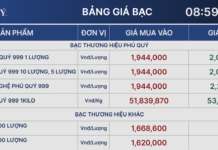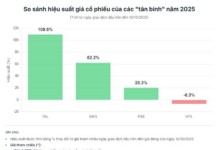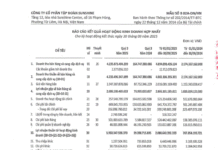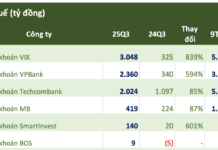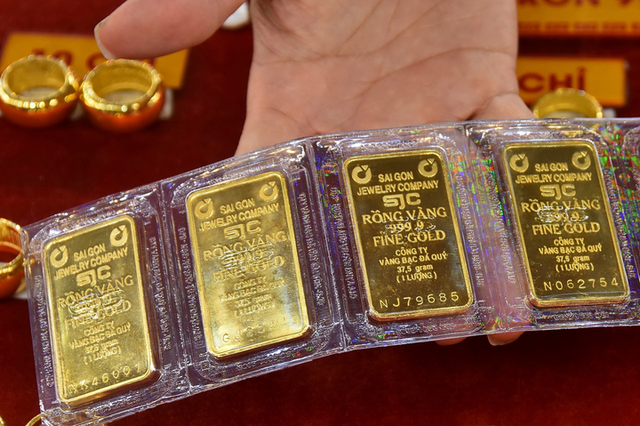
Illustration
In recent times, the price of gold has been continuously fluctuating, especially before and after the Lunar New Year, particularly in the period near the Day of the God of Wealth. Furthermore, one of the issues that has attracted a lot of attention is the amendment of Decree 24 on the management of gold business activities and the possibility of eliminating the monopoly on gold bars.
In Directive No. 06/CT-TTg on urging the implementation of key tasks after the Lunar New Year holiday, Prime Minister Pham Minh Chinh has urgently requested the State Bank of Vietnam to summarize Decree 24 on the management of gold business activities.
Alongside this, the State Bank of Vietnam also needs to propose effective solutions for managing the gold market in the new situation in the first quarter of 2024. From the end of 2023 until now, the Prime Minister has continuously directed state management agencies to evaluate and review the gold market.
Previously, at a press conference to implement banking tasks in 2024, Deputy Governor of the State Bank of Vietnam Dao Minh Tu stated that during this time, the State Bank of Vietnam has gathered opinions from relevant ministries, sectors, associations, businesses, and experts on the report assessing and evaluating Decree 24.
“In January 2024, the State Bank of Vietnam will submit a report summarizing Decree 24, which will include proposals for amendments and additions to certain mechanisms for managing the gold market to be suitable for the new context,” Tu said.
Regarding the amendment of the mechanisms, Deputy Governor Dao Minh Tu added that the most important goal during the process of building and implementing Decree 24 is to prevent the economy from becoming reliant on gold and to prevent any adverse impacts on the macroeconomic aspects such as inflation, exchange rates, and interest rates.
According to the Deputy Governor, Decree 24 stipulates the State Bank of Vietnam’s monopoly on trading gold bars, and this regulation has met the set expectations. However, because it was issued 11 years ago, and the economic and social conditions have also changed, it is necessary to amend Decree 24 sooner rather than later.
“We are considering whether the monopoly on SJC gold bars is still necessary. Many experts also believe that there is no need for SJC to have a monopoly or the need for multiple different gold brands. However, whether it is the monopoly of SJC gold bars or various types of gold, the ultimate goal is to achieve effective management to stabilize the gold market, to not have an impact on the macroeconomy, and to ensure the rights and interests of 100 million people,” Tu stated.
The Deputy Governor also emphasized that the interests of gold business entities are very small compared to the benefits of the entire population of 100 million people, and the State does not protect the price of gold bars but always respects the right to buy, sell, store, and preserve gold for the people.
“The State does not encourage the business of gold bars and does not protect the prices of gold business entities. The State Bank of Vietnam also does not accept significant price differences between domestic gold and international gold, or between SJC gold and other types of gold. All of these issues will be considered in the upcoming amendment of Decree 24. How the amendment will guarantee both management and market aspects will be implemented and widely consulted,” Deputy Governor Dao Minh Tu said.
Speaking at a recent online discussion organized by the Government Portal, Prof. Hoang Van Cuong, Vice-Rector of the National Economics University and a member of the Finance and Budget Committee of the National Assembly, stated that Decree No. 24/2012/ND-CP on the management of gold business activities was issued in 2012. At that time, gold was seen as a means of payment, almost replacing money, during the period of “gold-ization of the economy.”
However, according to Prof. Cuong, the situation has changed a lot since then. The fact that we are still maintaining Decree No. 24/2012/ND-CP, which stipulates that “the State is the sole entity in the production of gold bars and has a monopoly in the management of the import and export of raw gold for the production of gold bars,” has led to many inconsistencies.
In reality, in recent years, the State almost considers one gold brand, SJC, as the national gold brand. “In addition to the monopoly, there should still be gold production and supply. However, in reality, there is almost no additional production of gold bars. Meanwhile, people’s mentality is to accumulate gold to hedge against risks, so naturally they choose SJC gold, the national brand, to accumulate. Since supply does not exist but there is demand, it will lead to an imbalance between supply and demand, and the price of gold will increase,” explained Prof. Cuong.
Prof. Cuong also stated that we do not have a system for gold imports and exports, and we cannot balance the domestic and international gold markets, resulting in the world gold price increasing only slightly but the domestic price increasing significantly. There have been periods in which the price has increased by 20 million dongs per tael, which is very irrational, causing damage to the people, who have to buy gold at a very high price. On the other hand, there is inequality between the same types of gold bars, even though they have the same quality of 9999 gold, the SJC gold brand favored by the State is priced very high.
Based on this analysis, Prof. Cuong believes that in the current situation, there is a need for a change in the method of gold management, and it is necessary to amend Decree No. 24/2012/ND-CP. State monopoly on one gold brand is not essential; instead, multiple businesses can be allowed to participate in the process of producing gold bars to meet the demand of the people. When supply is free and equal, people will have easier access to gold accumulation, and the situation of scarcity that drives up the price of gold will no longer exist.
Prof. Hoang Van Cuong also suggested connecting the domestic gold market with the international market, considering the import and export of gold with appropriate management methods. Instead of maintaining the previous licensing and quota system in the form of “asking and granting,” financial tools can be used to regulate import and export relations to avoid the situation of excessive foreign currency used for purposes other than gold imports, leading to an imbalance in foreign exchange reserves and the loss of the ability to manage the exchange rate, etc.

